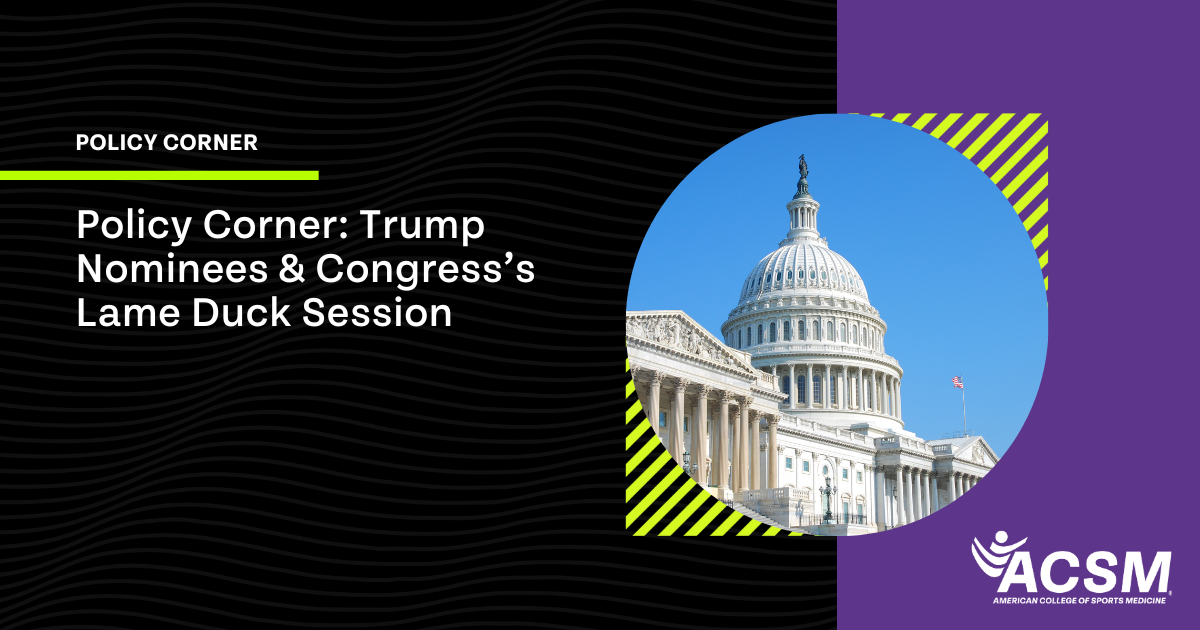 The recent elections underscored the nation’s ongoing political divisions while highlighting key trends and shifts in voter priorities. Across the country, voters turned out to decide pivotal races for Congress, state legislatures and local offices, as well as ballot measures addressing issues like abortion rights, economic policy and voting access.
The recent elections underscored the nation’s ongoing political divisions while highlighting key trends and shifts in voter priorities. Across the country, voters turned out to decide pivotal races for Congress, state legislatures and local offices, as well as ballot measures addressing issues like abortion rights, economic policy and voting access.
Trump nominees
President-Elect Donald Trump has continued to announce nominations for his incoming administration — including his picks for HHS secretary, CDC director, NIH director, FDA commissioner and surgeon general:
- HHS secretary nominee Robert Kennedy Jr. is an American environmental attorney, author and political activist known for his work on environmental and public health issues. Kennedy has become a controversial figure due to his opposition to vaccines and public health mandates, citing concerns about safety and government overreach.
- CDC director nominee Dr. David Weldon, a practicing internist and former U.S. representative from Florida, has previously sponsored legislation aimed at expanding vaccine safety research and has been a vocal advocate for transparency in public health policy. His nomination aligns with the administration’s focus on reforming federal health agencies.
- NIH director nominee Dr. Jay Bhattacharya, a professor of medicine and economics at Stanford University, gained prominence during the COVID-19 pandemic for advocating focused protection strategies and co-authoring the Great Barrington Declaration, which called for fewer lockdowns and a pandemic strategy centered on focused herd immunity. His research spans public health policy, the economics of aging and global health.
- FDA commissioner nominee Dr. Marty Makary, a Johns Hopkins surgeon and public health researcher, has called for greater transparency in regulatory decisions and has expressed concerns about vaccine mandates, emphasizing a data-driven approach to public health. His focus includes reducing regulatory burdens and encouraging innovation in health care.
- Surgeon general nominee Dr. Janette Nesheiwat, medical director at CityMD and a regular media commentator on Fox News, has been an advocate for preventive care and patient education, supporting COVID-19 vaccines while opposing mandates. Her experience in urgent care and public health communication is expected to shape her approach to the role.
Lame Duck Congress
Congressional leaders in the House and Senate are working to negotiate a funding agreement to prevent a government shutdown as Fiscal Year (FY) 2025; funding is set to expire on Dec. 20, 2024. With the deadline fast approaching, a temporary funding measure known as a continuing resolution (CR) appears increasingly likely. This CR would likely extend federal funding into February or March 2025.
Additionally, the CR is expected to include a supplemental disaster aid package. While the Biden administration has requested $98.6 billion for disaster relief, Speaker Mike Johnson (R-LA) faces pressure from some members of his party to either reduce this amount or include cost-offsetting policy changes, leaving the final funding level uncertain.
Several key health programs are also set to expire by the end of the year if not addressed in the funding package. These include:
- Medicare telehealth flexibilities,
- The Medicare Acute Hospital Care at Home (AHCAH) program,
- The Medicare Dependent Hospital (MDH) and Low Volume Hospital (LVH) programs,
- The Teaching Health Center Graduate Medical Education (THCGME) program,
- The National Health Service Corps (NHSC),
- The Pandemic and All-Hazards Preparedness Act (PAHPA) programs, and
- The Substance Use Disorder Prevention that Promotes Opioid Recovery and Treatment for Patients and Communities Act (SUPPORT Act) programs.
In addition, unless Congress acts, a 2.83% cut to the Medicare Physician Fee Schedule (PFS) conversion factor is set to take effect in 2025. Bipartisan and bicameral efforts are underway to urge leadership to address these program expirations and the looming PFS cut as part of any year-end legislative package.
New CMS Framework on Care
On Dec. 10, 2024, the Centers for Medicare & Medicaid Services (CMS) released a new health care delivery framework entitled Optimizing Care Delivery: A Framework for Improving the Health Care Experience. The report outlines CMS’s five-year strategy to address administrative burdens and other frictions in the health care system with the goal of improving the care experience for patients, clinicians and other stakeholders. According to the report, these burdens limit timely access to quality care, contribute to workforce challenges and exacerbate health disparities.
The framework introduces a set of seven strategic priorities to guide CMS’s efforts in enhancing the delivery of care and the overall health care experience.
- Priority 1: Integrate the voice of the patient and caregiver into opportunities to increase equity in care access and delivery.
- Priority 2: Improve patient safety and reduce administrative burden in care transitions.
- Priority 3: Address well-being and experience for health care workers across the health care enterprise.
- Priority 4: Improve care-approval processes to increase access to care and reduce care delays.
- Priority 5: Reduce redundant or outdated data collection, documentation and reporting requirements.
- Priority 6: Leverage technology to accelerate innovation and the adoption of best practices.
- Priority 7: Convene and support public-private partnerships to advance the health care experience and burden-reduction efforts.
View the Framework